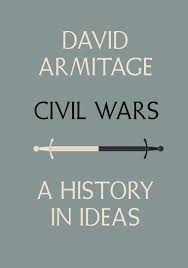I received a copy of this book from the publisher in exchange for an honest review.
 This book is different from what I usually review. I want to give fair warning to anyone reading this that Civil Wars is very much an academic text. I don’t say this to make it sound dry or boring, because it was neither of those things, but I know that this won’t appeal to everyone. I love footnotes and new ideas presented to me as an essay or thesis, so if you feel the same, read on fellow nerd, read on.
This book is different from what I usually review. I want to give fair warning to anyone reading this that Civil Wars is very much an academic text. I don’t say this to make it sound dry or boring, because it was neither of those things, but I know that this won’t appeal to everyone. I love footnotes and new ideas presented to me as an essay or thesis, so if you feel the same, read on fellow nerd, read on.
The subtitle of this book really sums up the content better than I can. Civil Wars: A history in ideas looks at the concept of civil war, and how we have come to understand it over time. Beginning in Ancient Greece and tracing the evolution of internal conflict through Rome, early modern Europe, 19th century America and through to the present, Armitage uses the historical record to examine how we perceive war, and how our perceptions have changed.
When I started reading this, I was immediately struck by how timely the book is, and I’m not even sure if Armitage could have anticipated that. He says “democratic politics now looks ever more like civil war by other means” (p. 19) and as I sit here in the relative safety of Canada watching the news from south of the border, I think that’s never been more true.
I think I had always assumed that civil war was a thing that humans did to each other, and I never stopped to really consider that there was a time where this wasn’t true. Greeks and Romans had very different ideas about whether or not infighting was really a war, and those ideas are just as different from each other as they are to our modern understanding.
In terms of readability, I have already mentioned that this is an academic text. Dr. David Armitage has a long list of academic credentials, including being the former Chair of the Department of History at Harvard, and this book is not written to be the sort of narrative non-fiction you seek out at your local bookstore. It’s the culmination of significant research and thought. I also found that having a solid understanding of the historical periods he’s talking about was beneficial. There was a time in my life where I thought I might stay in academia and do my MA and PhD in History. Alas, the library called, but I have found my undergraduate degree to be extremely useful in variety of situations and would recommend to anyone that taking the time to learn your history is well worth it.
I really enjoyed this book. It was great to get back into reading something that reminded me of my love of history and of academia in general. Being a librarian, life-long learning has become a bit of cliché, but I really believe in it. This book allowed me to use what I already know to read a compelling argument and consider the implications on our world today.
I know that of all the blog posts I’ve written about great books, this one will likely result in the least number of people picking up the book, but that’s okay. It doesn’t have to be this book that you read next. I would encourage you to find a topic you want to learn more about and just go for it. The Great Courses, Coursera, Audible and of course your local library all have fantastic resources to help you expand your knowledge.
*Page numbers were taken from the NetGalley digital edition of this book and may not reflect the pagination in the print edition.
 I’ve been trying to write this review for a little while now. I had a draft, tossed it out, googled “how to write a book review” (I kid you not) and then came back to this again.
I’ve been trying to write this review for a little while now. I had a draft, tossed it out, googled “how to write a book review” (I kid you not) and then came back to this again.